Tuesday, June 27, 2006
Flood Gates Open
I'm not sure if this real-time stream flow gauge makes sense. http://waterdata.usgs.gov/md/nwis/uv?01592500
Discharge, cubic feet per second Most recent value: 4,500 06-27-2006 04:15.
It might be broken. This flow is greater than the flow that followed Hurricane Agnes in 1972.
Monday, June 19, 2006
Anonymous said...
 Regular readers soon realize that the most interesting bits of this blog are provided by the readers via the comments section. Since my purpose is to discover and encourage connections within our community, I want to make it as easy as possible for folks to share their own news and opinions. So, I encourage all comments to be posted, both attributed and anonymous.
Regular readers soon realize that the most interesting bits of this blog are provided by the readers via the comments section. Since my purpose is to discover and encourage connections within our community, I want to make it as easy as possible for folks to share their own news and opinions. So, I encourage all comments to be posted, both attributed and anonymous.Some readers have privately taken me to task for allowing anonymous comments, but I believe there is a long tradition of unattributed political discourse in America.
When you post your comment, you are asked to either supply a name or you can post anonymously. The Blogger software doesn't know who you really are, so any name you provide is accepted. The Blogger software also allows me to delete any comment. This all leads us to an important issue. To wit; should I ever censor reader comments? And if so, what is my policy for censoring? This policy problem is like red meat for a lifetime bureaucrat like me to think about.
I decided to only censor a comment if I judge it to be in poor taste or an ad hominem attack. If I decide to censor a comment, I will always remove the entire comment. I will never selectively edit a comment.
Moreover, I have set a higher bar for attributed comments. In other words, an anonymous comment may cross my line sooner than somebody willing to publicly stand behind their words.
I have only removed one comment in all of the 47 posts that have been published on this blog. It was an anonymous comment to one of the candidate interviews posted during the Laurel election season. I decided that it met my threshold of an inappropriate ad hominem attack and I removed it within a few minutes of its posting.
That's my policy. I would appreciate your thoughts.
-rick
Friday, June 16, 2006
The Sound of Silence
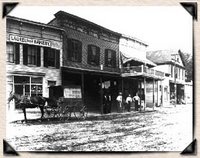 Is it just me, or have the Laurel City Council members and challengers been quiet about a Main Street manager?
Is it just me, or have the Laurel City Council members and challengers been quiet about a Main Street manager?Remember all the hewing and crying during the recent election season? Lots of foot stomping about how good or bad Main Street was doing.
But nary a word since the election. Where are the legislative fixes ? Where is the manager's salary in the recently passed FY07 budget? Where are the council challengers, who promised to stay involved?
Alas, I remember the same deafening silence following the last election.
If it comes up during the next election, I'm going to cry foul. There is simply no Main Street problem, except during an election season. And that is a problem that can be best fixed by simply ignoring it.
Wednesday, June 14, 2006
Amazon A Go-Go ... All A Gone-Gone
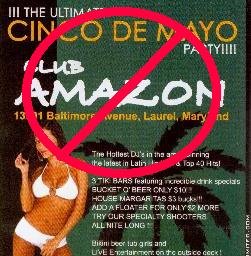 The Amazon Strip Club liquor license "show cause" hearing ended in a victory for the Laurel community tonight.
The Amazon Strip Club liquor license "show cause" hearing ended in a victory for the Laurel community tonight. Update: Also see Joe Murchison's detailed report of the hearing at the Laurel Leader website.
The Amazon's owners proffered a settlement where they agreed to never, ever, open up again at that address. This was an admission of guilt on their part. The owners then asked for 90 days to try to sell their license.
The board agreed to the deal and fined the Amazon's owners $5000 dollars for their violations. This ends the Strip Club saga at that location. Unfortunately, this does not solve the strip club problem throughout the county.
Until we can get the courts to see that taking your clothes off and writhing around a pole is not what the framers of the constitution meant as speech, we need to be more vigilant.
There is just no excuse for the slipshod way the liquor board works today. There should be a website where anyone can get specific and timely notification of any and all liquor license transactions anywhere in the state. The State and the County Council must pass liquor license sunshine laws.
There were about 65 other concerned citizens at the hearing. You should know that Laurel was well represented. Oldtown's own Susie Marucci made the trip. County Council Member Tom Dernoga was in there swinging hard. City Council Members Leszcz, Robison, Sarich, and Snyder made the trek and were part of the negotiations. LPD's finest, Chief Crawford, Deputy Chief McLaughlin, and Lt. Pollock made time for the hearing. As did Kim Rau, the best City Council Clerk in the State of Maryland. My personal heroes in this whole affair were Bob Manzi and Ben Barnes, lawyers working for the community.
If we stick together and use technology to stay vigilant, we can shine a little sunshine into their smoke filled back rooms. Both the strip club's rooms and the county commission hearing rooms.
- rick
p.s., I want to welcome Mike Sarich to the community blogsphere. It takes a lot of guts for an elected official to write a blog. My hat is off to him.
Tuesday, June 13, 2006
Mayo Bombs, Speed Humps and Squeeze Plays
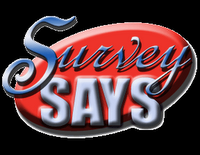 The readers of this blog are pretty quick in registering their opinions about traffic calming strategies for Laurel. In the 21 hours since midnight on the 12th until about 9 pm on the 13th, 88 people read the previous blog post about traffic calming. Of those 80, about 37 people participated in the survey.
The readers of this blog are pretty quick in registering their opinions about traffic calming strategies for Laurel. In the 21 hours since midnight on the 12th until about 9 pm on the 13th, 88 people read the previous blog post about traffic calming. Of those 80, about 37 people participated in the survey.I've loaded all of the results from the survey for your reading pleasure way below. It is a bit of a chore to wade through, but there are some really interesting ideas offered in the text options. I especially liked the mayo and sniper suggestions.
Here is my initial analysis:
1/3 of us follow the traffic rules all the time. 2/3's most of the time. 2 people have lead feet. (I think one of these was my wife, Joanne. (Go get her Chief Crawford!)
60% believe we have a problem with excessive speed.
Regarding the choices for traffic calming options, I assigned 3 points for a first choice, 2 points for a second and 1 point for a third choice. Based on that algorithm, we see that we have pretty much a statistical tie for the first three options; enforce (66), impede (53), squeeze (63). Inform was pretty much rejected at 21 points.
Here are the definitions of the options:
Enforce - increase number of police/radar patrols.
Impede - build speed bumps or humps that force vehicles to slow down. Squeeze - create visual traffic choke points in the roadway that tend to limit speed. Usually thickly painted lines jutting out like islands from the curb that take away part of a lane. This tends to force traffic to maneuver towards the center-most lanes. Sometimes thin rubber pickets are used in addition to the painted lines to make an even more substantial visual choke island.
Inform - additional signage to remind drivers to slow down. For example, more speed limit signs, brightly painted signs, electronic message boards, flashing lights (like school zones) or devices that measure and display your vehicle's current speed.
1. I am:
Response Percent/Response Total
a resident of Laurel - 86.5%/32
employed in Laurel - 8.1%/3
neither,but I like to drive through Laurel - 2.7%/1
Other (please specify) -2.7%/1
1. past resident of Laurel
2. I drive the 25 mph speed limit while on residential streets:
all the time 29.7%/11
most of the time 64.9%/24
are you kidding, 25 mph is too impossibly slow 5.4%/2
3. Do you think there is a speeding problem on our residential streets?
Yes - 59.5%/22
No - 8.1%/3
I'm not sure, I need to see the data - 10.8%/4
Other (please specify) - 21.6%/8
1. Mostly Main Street (no stop signs) and I've had people pass me on Brooklyn Bridge Rd.
2. More accurate to say there is a traffic problem. Many Laurel City streets are carrying pass-thru traffic.
3. There are many safety problems on our streets, mostly due to inattentive drivers and pedestrian who don't use common sense. But even the radar on Fourth St. showed that 85% of the cars were not speeding. Slowing down the cars might help, but it won't erase all the safety problems.
4. Yes -- by a small percentage of drivers. 5. on some of our narrower streets, the average traffic is quite slow. The wider and longer streets have much faster traffic...4th street is not as big a speed problem as some - though ALL of our streets have "extreme speeders" sometimes - the most dangerous.
6. Mostly on main roads, i.e. Montrose, Montgomery, Van Dusen, Cherry Lane.
7. Only on a few streets, I believe. At "Speeding" meetings I have asked the DPW and the police department to post the results of their Fourth Street surveys twice, but neither has done so
8. yes, a few people speed excessively but most do not--it is the extreme. Also the volume of traffic is high
4. What would be your FIRST choice to reduce speeding on our residential streets? Please select only one.
enforce: write more speeding tickets - 32.4%/12
impede: speed humps or bumps - 21.6%/8
squeeze: road chokes - 35.1%/13
inform: better signage - 8.1%/3
Other? 2.7%/ 1
1. Write tickets -- xx mph over speed limit write ticket for not only speeding, also reckless driving -- impound cars for reckless driving
5. What would be your SECOND choice to reduce speeding on our residential streets? Please select only one.
enforce: write more speeding tickets - 27%/10
impede: speed humps or bumps - 32.4%/12
squeeze: road chokes - 16.2%/6
inform: better signage - 13.5%/5
Other? - 10.8%/4
1. Stop signs are the only time proven method of truly forcing vehicles to reduce speed in residential neighborhoods.
2. More speeding cameras
3. Zero tolerance on speeding tickets.
4. speed carts to display speed
6. What would be your THIRD choice to reduce speeding on our residential streets? Please select only one.
enforce: write more speeding tickets - 27.8%/10
impede: speed humps or bumps - 13.9%/5
squeeze: road chokes - 33.3%/12
inform: better signage - 5.6%/2
Other? - 19.4%/7
1. School zones with lights that flash yellow during arrival and dismissal times and "fines doubled when lights flashing" signs.
2. Raise the speed limit to 30 in residential areas.
3. neither of the other two work, road chokes on two way streets bring cars together (often dangerously ) and who cares about signs if you're going too fast to read them?
4. Snipers.
5. Local Traffic Only on some streets.
6. Do not have a third choice.
7. Squeezes and information don't work...like drivers don't know they're speeding. Please!
7. (OPTIONAL) What other comments to do you have?
1. Speed humps & bumps really slow down and in some cases damage emergency vehicles.
2. Fourth choice: Citizen enforcers armed with mayonnaise-filled balloons. Depending on the accuracy of the hurler and time between car washes, speeders should be easier to spot. If speeding tickets aren't a deterrent, maybe some incoming Hellman's would be.
3. 4th Street is not the only street that needs help. On any given week day morning I see at least 10 - 12 cars speeding down Prince George St towards Route 1. This issue should be looked at in the entire City area not just 4th street.
4. Certain speed traps around Laurel have, in the past, forced or encouraged drivers to switch from arterial roads, such as MD 198, to residential streets, such as Montrose Ave. (Just one example). I would suspect that Van Dusen Road and Cherry Lane could be made to fall into the same category.
5. Someone going 30-35 in a 25 zone is not really the problem as I see it. The problem is those cars that will be cutting through a neighborhood and go zooming by at an obviously inappropriate speed - like 45-50 on a residential block.
6. In many cases, obvious revenue raising speed traps simply generate contempt for law enforcement by everyone. Speed traps should be placed in real accident danger areas, not on straight flat stretches of high speed Interstate highways that have too slow speed limits. The contempt raised by stupid state cops generalizes down to small town police departments.
7. Huge difference between humps and bumps. Vehicles ars are designed to absorb bumps better at higher speeds, so bumps punish drivers for driving slower. Humps work opposite. I support humps and oppose bumps. I oppose allocation of taxpayer resources for ROUTINE speed trapping, either manual or automated. Speed traps are extreme measures only warranted AFTER passive observation (automated or manual) establishes that speed humps and chokes have failed.
8. Montpelier and Beltsville I would imagine have similar problems-- residential streets become thoroughfares as people begin to drive though neighborhoods to avoid Route 1, the parkway, the beltway, or the interstate. I notice the annoying speed bumps whenever I am driving to friends' houses in both areas. Why not follow their example and annoy our drivers into slowing down?
9. Main Street is a special problem. I have to cross the street at least twice daily, and even though I use the cross walks, I would guess about 50 per cent of the drivers totally ignore the crosswalks. They sometimes even increase their speed as they see me step into the cross walk. Many of the drivers are distracted on cell phones - I think that is the critical mass of ignoring a crosswalk - if you are on the cell phone, a croos walk presents too much information to process and the driver continues through without stopping, while talking a mile a minute and making hand gestures to the talker on the other end of the conversation. I think another set of traffic lights is needed between Route 1 and Route 216, say at 6th street. This may slow the traffic down. I know, I know, Main street is a "State Road" and all that - but the speeders are out of control. Everything has been tried here and nothing works. Please put two "you are traveling at --- speed" on each end of main street - this may help for now.
10. enforce works, at least it did for me. Caught going 40 mph on Sandy Spring Road a few years ago (25 mph is the speed limit) and slapped with a fine, I haven't exceeded on a city road since then.
11. I'd like to install speeding cameras on every street in Laurel, get the DMV to get people's checking account number when they register to drive, and simply deduct the fine from their account.
12. The problem is gonna get worse once the work on ICC is done.
13. humps so large they require slowing to far below the speed limit or coming to a stop aggravate me. If that's needed, lower the speed limit more. But a 30MPH road with bumps you need to take at less than 5mph...grrr. See Hyattsville for an example of this. I had a medical condition for a while that made even bumps very painful even at very slow speeds.
14. Enforcing is a temporary fix. Impeding and squeezing are permanent. Regarding signage - people can easily ignore it.
15. Enforce with more speeding tickets appeals to me the most, because others don't have to suffer, and it also comes with consequences, such as points. But I'd need to know the other costs, such as more police necessary? Taking the focus away from other crimes and crime prevention?
16. I like the bumps/lumps in the road. I use cedarbrook drive, and before the bumps went in, I rarely/never went 25. Since the bumps went in, I keep the speed down.
Monday, June 12, 2006
Q - I never exceed the speed limit, yes or no?
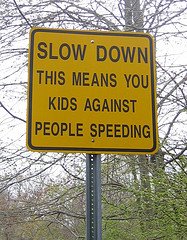 We all try to obey the traffic laws. Most of us drive the speed limit ... most of the time. But some of us drive way too fast ... some of the time.
We all try to obey the traffic laws. Most of us drive the speed limit ... most of the time. But some of us drive way too fast ... some of the time.The most frequently cited complaint from citizens when I was a Laurel council member was that cars were driving way too fast in their neighborhoods.
Many people agree that speeding on residential streets is a problem in Laurel. It is a problem all over the state. Small town police departments do everything possible, but putting out a permanent radar enforcement unit is almost impossible.
Unfortunately, a bill that would have allowed Montgomery and Prince George's counties to install a fleet of speed radar cameras on residential streets and in school zones died in a House committee without a vote in 2004. A bill was passed in 2005, just for Montgomery County, but not in Prince Georges County. (This is an issue to bring up with the candidates.)
Kara Weinstein has been working with the City government and her neighbors to reduce speeding on the 400 and 500 blocks of 4th Street. She writes a great article about her crusade in the comments section of this post. Click here to read her article.
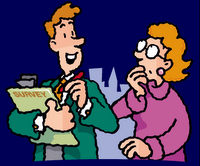
I've whipped up another quick survey to explore the traffic calming problem in Laurel. Please take a few minutes to answer it. Click here to take the survey. I'll post the results here in a few days.
Your comments are always appreciated. Please send this blog link to your friends and neighbors. Thanks again for reading.
rick
Tuesday, June 06, 2006
To Blog or Not To Blog?

A couple of months ago, Steve Early from the Gazette asked me, via email, a series of questions about this blog and why I was writing it. He never used my answers. I think they were too long for a newspaper article. So I thought I would include a version of what I sent him here. As always, your questions and comments are welcome. -rick
----------------------------------------------------------
Why did you start blogging about Laurel?
Sometimes it is easier to know what is happening on the other side of the globe than what is going on across the street. There are thousands of news gathering organizations covering big stories around the country but only a few papers are covering stories about Laurel.
I’ve been a news hound since grade school. Local news has always been the most interesting for me. Weekly newspapers do a great job but waiting until Thursday to find out what’s going on around town just kills me. As web technologies like blogs began maturing I started to consider how they might be used to provide local news more efficiently.
I started reading Westport Now! a couple of years ago. It is a local news blog written by a team of folks in Connecticut. I emailed some questions to the founder, Gordon Joseloff, and he wrote back and explained how he created his site.
Do you have a journalism background?
I’ve never been a professional journalist. But I have always been interested in collecting and telling stories. I was trained as an engineer but I wrote for my high school newspaper and have remained curious about the craft since then. I’ve written a few articles for the Leader. They were very supportive of my rookie efforts.
I think everyone is a journalist. We all tell stories. It’s part of being human. Communities grow by the stories we tell each other.
In my next life, I would love to create long-form radio features for NPR. I plan on trying out audio files (podcasts) on my blog when I can find some time.
What is the role of a blog? How does a blog compare with the more traditional press?
It depends on what you mean by traditional press. When people mention "journalism" today, most people think about professional journalists and commercial news organizations like the Leader and the Wash Post. But long before there were professional journalists, people were telling stories around the camp fire.
Today, thousands of mainstream reporters swarm all over the big national stories. But only a couple of folks pound the pavement in Laurel. Commercial media need a large audience to generate enough advertising revenue to stay alive. Local news, features and opinion pieces are relegated to a few dedicated weeklies and an occasional story in a metro daily.
How many unique Laurel stories do you think are covered by the Post, Sun, Gazette and Leader collectively in one week? I would guess that there are less than 25 news stories published by the traditional outlets in any given week.
But how many interesting and important stories are told in Laurel's coffee shops and offices everyday? How many local stories are sent via email? Shared at PTA meetings, club meetings, schools and church events? How many are tossed over the back yard fence, front porches and over shopping carts at the super market every week? Maybe thousands?
Obviously, each story is only important to a small circle of people, but collectively they define and shape our community for that week. Blogs provide a cheap and efficient tool to narrow cast important stories for only a few people.
But blogs can even go one better than dead tree technology. Once you post a story on the blog, other people can immediately comment, telling you where you got it wrong or they can add to the story from their own perspectives. Blogs create a diverse tapestry of interactive voices and shared perspectives. In their most useful form, blogs engage their participants in a collective conversation. Conversation creates stronger bonds in a community than the more passive media of traditional newspapers, magazines, television, or radio.
Another benefit of a blog is that we can archive stories and conversations forever. And they are also easily searchable, so in the future we will be able to effortlessly turn back the clock and replay any discussion to more fully understand how we got from there to here. Imagine if bloggers commented to the Federalist Papers in 1789?
Professional journalists work hard to discover the truth. Traditional outlets are expected to be fair, to get all sides to a story, to check their facts. When a mainstream media company prints or broadcasts a story, it puts its institutional reputation on the line. When I write a story on my blog, I put my personal reputation on the line.
If somebody tells you a story in a bar, do you always believe it? Maybe your buddy on the next bar stool got his facts wrong, or simply lied to you. On a blog, the reader must be a much more critical information consumer. We need to evaluate information based on the source.
What posts have generated the largest response, either online or elsewhere?
The most interesting reaction I got was from a couple of good friends who accused me (separately) of creating a public nuisance with this blog. They were upset with me for allowing untruthful comments to be posted during the recent election. Or at least they thought the comments were untruthful.
I tried to explain that a blog is a public forum not a newspaper. I suggested that if they felt that some comments were incorrect, they should post their own views. The both declined to participate that way.
I know that some people will never be comfortable engaging in public debate for the record over the Internet. I think that the power of a community blog is that it brings sunlight into the public process. Folks who want to stay in the shadows of the backroom will find that their power is eroding. Power will shift to new leadership models leveraging a two-way public discussion of a blog.
What were you trying to accomplish with your city election coverage?
My timing for the blog was specifically planned for the Laurel elections. The only time some issues ever get any traction is in the 6 weeks preceding an election. So, like Willie Sutton said when asked why he robbed banks, “That’s where the money is.” I purposely ramped up the blog because elections are where the energy is.
What plans do you have for the future of the blog? How can you reach outside the traditional audience and make sure you’re not just preaching to the choir?
Not sure I want or need to reach beyond the choir. I don’t want to turn the blog into a mainstream media wanna be.
The net lets us effortlessly bind ourselves together via links. I don’t need to grow my blog’s reach at all. I have a dream where every church, PTA, club, neighborhood, business, city department and government institution has somebody collecting and sharing their unique stories via blogs. I then can easily link their stories to mine, constantly adding to and reshaping the conversation. Just like we do when we fgmeet on the street and share our stories.
I want to continue writing stories that interest me here in Old Town Laurel. I am interested in local history. I love wallowing in a good policy wonk story or deeply analyzing a budget. Traditional local weeklies can’t afford the space to really dig into a complex policy or budget story, but a blog has no limits other than my own energy.
I also want to experiment more with pictures, audio and video stories. I used to produce a few television shows for the local public access channel in Laurel. It would be interesting to adapt some of those show concepts for the blog.
I’ve been trying to figure out how to use free net meeting technologies to create and distribute a public policy talk show where the panelists participate from their own homes and offices via the net. The audience would ask them questions online. I think it would be cool to do a real-time talk show over the net like this for hot local issues.